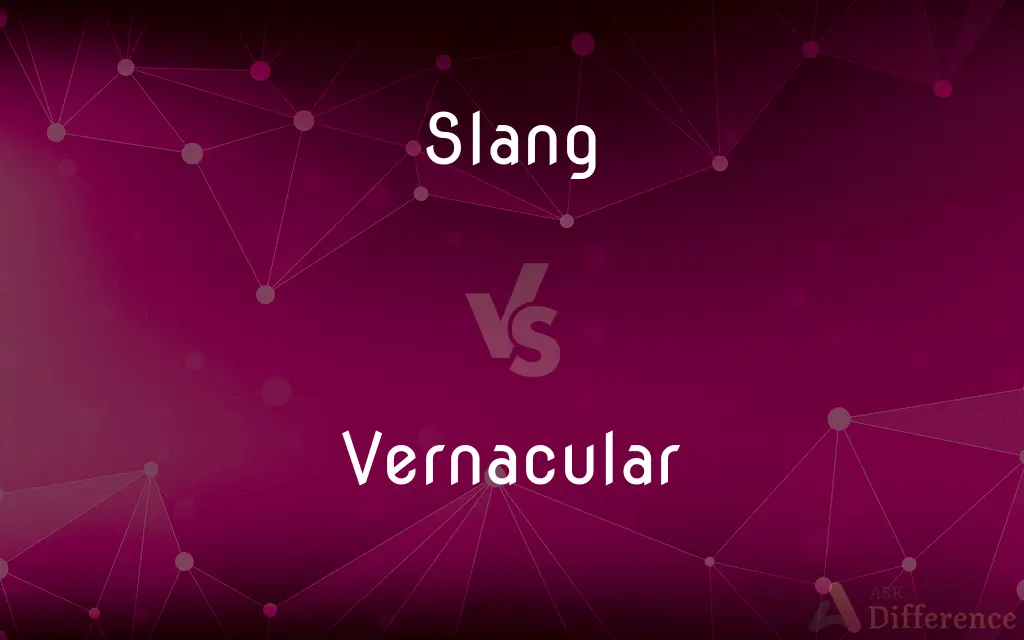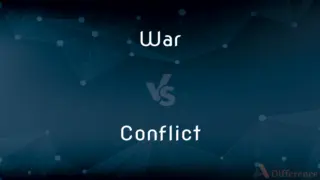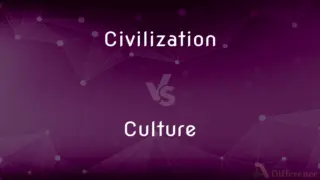Slang vs. Vernacular — What's the Difference?
By Maham Liaqat & Urooj Arif — Updated on April 3, 2024
Slang is informal, often inventive language used by particular groups, whereas vernacular refers to the common language spoken by people of a particular region or group.

Difference Between Slang and Vernacular
Table of Contents
ADVERTISEMENT
Key Differences
Slang consists of words or phrases that are informal and often used by specific groups to express identity or subculture. These expressions can be novel, ephemeral, and vary widely between communities. On the other hand, vernacular language is the standard speech of a particular region, encompassing both formal and informal expressions used in daily communication. It represents the linguistic background of a community.
While slang is characterized by its transient nature, changing rapidly with trends and social groups, vernacular language has a more stable foundation, evolving over longer periods. Slang often becomes outdated as quickly as it becomes popular, reflecting the dynamic nature of the groups that use it. Conversely, changes in vernacular language reflect broader shifts in society and culture over time.
Slang serves as a marker of identity, distinguishing members of a group from the outside. It can signal insider knowledge or status, creating a sense of belonging among its users. Vernacular, however, is a marker of regional or ethnic identity, shared by all members of a community regardless of their social status. It's a broader reflection of the community's culture and history.
The use of slang is typically more prevalent among younger generations, who often create and adopt new slang terms as a form of rebellion or to establish a generational identity. Vernacular language, in contrast, is used across all age groups and serves to unite speakers by their common cultural or regional backgrounds.
Slang is often viewed with suspicion or disdain by those outside the group, sometimes considered to be corrupting or degrading the language. Vernacular language, while also subject to prejudice, especially in contexts where a standard language variety is highly valued, is generally recognized as a legitimate expression of a community's linguistic heritage.
ADVERTISEMENT
Comparison Chart
Definition
Informal language used by specific groups
Common language of a particular region or group
Nature
Transient and inventive
Stable and encompassing both formal and informal speech
Function
Signals identity and subculture membership
Serves as a marker of regional or ethnic identity
Users
Often younger generations
All members of a community
Perception
Viewed as rebellious or non-standard
Recognized as a legitimate expression of linguistic heritage
Evolution
Changes rapidly with trends
Evolves over longer periods reflecting societal shifts
Compare with Definitions
Slang
Informal language used among particular groups to express identity.
Ghosting is slang for suddenly cutting off all communication with someone.
Vernacular
The language or dialect spoken by the ordinary people in a particular country or region.
The vernacular of New Orleans includes unique phrases and accents.
Slang
A type of language that is playful and trendy among young people.
Fleek was slang for something looking perfect.
Vernacular
Language that reflects the culture and history of a region.
Creole languages are vernaculars that blend elements from multiple languages.
Slang
Expressions that can rapidly become outdated as new terms emerge.
Lit was slang for something exciting or excellent, but its popularity has waned.
Vernacular
Everyday language used by a community, encompassing both formal and informal styles.
Vernacular architecture uses locally sourced materials and traditional designs.
Slang
Words or phrases that are used informally, often in specific contexts or groups.
Binge-watch is slang for watching many episodes of a TV series in succession.
Vernacular
Speech that is not elevated or literary but used in ordinary conversation.
In his novels, he captures the vernacular of rural Texas with accuracy.
Slang
Language that may not be understood outside of a specific community.
Noob is gamer slang for a novice player.
Vernacular
The linguistic expression of societal norms and values.
Vernacular storytelling preserves and transmits the oral traditions of a community.
Slang
Slang is language (words, phrases, and usages) of an informal register. It also sometimes refers to the language generally exclusive to the members of particular in-groups prefer over the common vocabulary of a standard language in order to establish group identity, exclude outsiders, or both.
Vernacular
A vernacular or vernacular language refers to the language or dialect that is spoken by people that are inhabiting a particular country or region. The vernacular is typically the native language, normally spoken informally rather than written, and seen as of lower status than more codified forms.
Slang
A kind of language occurring chiefly in casual and playful speech, made up typically of coinages and figures of speech that are deliberately used in place of standard terms for added raciness, humor, irreverence, or other effect.
Vernacular
The language or dialect spoken by the ordinary people in a particular country or region
He wrote in the vernacular to reach a larger audience
Slang
Language peculiar to a group; argot or jargon
Thieves' slang.
Vernacular
Architecture concerned with domestic and functional rather than public or monumental buildings
Buildings in which Gothic merged into farmhouse vernacular
Slang
To use slang.
Vernacular
(of language) spoken as one's mother tongue; not learned or imposed as a second language.
Slang
To use angry and abusive language
Persuaded the parties to quit slanging and come to the bargaining table.
Vernacular
(of architecture) concerned with domestic and functional rather than public or monumental buildings
Vernacular buildings
Slang
To attack with abusive language; vituperate
"They slanged each other with every foul name they had learned from the age of three" (Virginia Henley).
Vernacular
The everyday language spoken by a people as distinguished from the literary language.
Slang
Language outside of conventional usage and in the informal register.
Vernacular
A variety of such everyday language specific to a social group or region
The vernaculars of New York City.
Slang
Language that is unique to a particular profession or subject; jargon.
Vernacular
The specialized vocabulary of a particular trade, profession, or group
In the legal vernacular.
Slang
The specialized language of a social group, sometimes used to conceal one's meaning from outsiders; cant.
Vernacular
The common, nonscientific name of a plant or animal.
Slang
(countable) A particular variety of slang; the slang used by a particular group.
Vernacular
Native to or commonly spoken by the members of a particular country or region.
Slang
(countable) An item of slang; a slang word or expression.
Vernacular
Using the native language of a region, especially as distinct from the literary language
A vernacular poet.
Slang
(India) A curse word.
Vernacular
Relating to or expressed in the native language or dialect.
Slang
Any long, narrow piece of land; a promontory.
Vernacular
Of or being an indigenous building style using local materials and traditional methods of construction and ornament, especially as distinguished from academic or historical architectural styles.
Slang
A fetter worn on the leg by a convict.
Vernacular
Occurring or existing in a particular locality; endemic
A vernacular disease.
Slang
A counterfeit weight or measure.
Vernacular
Relating to or designating the common, nonscientific name of a biological species.
Slang
A travelling show, or one of its performances.
Vernacular
The language of a people or a national language.
A vernacular of the United States is English.
Slang
A hawker's license.
Vernacular
Everyday speech or dialect, including colloquialisms, as opposed to standard, literary, liturgical, or scientific idiom.
Street vernacular can be quite different from what is heard elsewhere.
Slang
A watchchain.
Vernacular
Language unique to a particular group of people.
For those of a certain age, hiphop vernacular might just as well be a foreign language.
Slang
To vocally abuse, or shout at.
Vernacular
A language lacking standardization or a written form.
Slang
To sell especially illegal drugs.
Vernacular
Indigenous spoken language, as distinct from a literary or liturgical language such as Ecclesiastical Latin.
Vatican II allowed the celebration of the mass in the vernacular.
Slang
Any long, narrow piece of land; a promontory.
Vernacular
(architecture) A style of architecture involving local building materials and styles, not imported.
Slang
A fetter worn on the leg by a convict.
Vernacular
Of or pertaining to everyday language, as opposed to standard, literary, liturgical, or scientific idiom.
Slang
Low, vulgar, unauthorized language; a popular but unauthorized word, phrase, or mode of expression; also, the jargon of some particular calling or class in society; low popular cant; as, the slang of the theater, of college, of sailors, etc.
Vernacular
Belonging to the country of one's birth; one's own by birth or nature.
A vernacular disease
Slang
To address with slang or ribaldry; to insult with vulgar language.
Every gentleman abused by a cabman or slanged by a bargee was bound there and then to take off his coat and challenge him to fisticuffs.
Vernacular
(architecture) Of or related to local building materials and styles; not imported.
Slang
Informal language consisting of words and expressions that are not considered appropriate for formal occasions; often vituperative or vulgar;
Their speech was full of slang expressions
Vernacular
(art) Connected to a collective memory; not imported.
Slang
A characteristic language of a particular group (as among thieves);
They don't speak our lingo
Vernacular
Belonging to the country of one's birth; one's own by birth or nature; native; indigenous; - now used chiefly of language; as, English is our vernacular language.
His skill in the vernacular dialect of the Celtic tongue.
Which in our vernacular idiom may be thus interpreted.
Slang
Use slang or vulgar language
Vernacular
The vernacular language; one's mother tongue; often, the common forms of expression in a particular locality, opposed to literary or learned forms.
Slang
Fool or hoax;
The immigrant was duped because he trusted everyone
You can't fool me!
Vernacular
A characteristic language of a particular group (as among thieves);
They don't speak our lingo
Slang
Abuse with coarse language
Vernacular
The everyday speech of the people (as distinguished from literary language)
Vernacular
Being or characteristic of or appropriate to everyday language;
Common parlance
A vernacular term
Vernacular speakers
The vulgar tongue of the masses
The technical and vulgar names for an animal species
Common Curiosities
What is vernacular?
Vernacular refers to the common, everyday language spoken by the people of a particular region or community, encompassing both formal and informal expressions.
Can slang become part of the vernacular?
Yes, slang terms can become part of the vernacular if they gain widespread acceptance and use beyond their original group.
Why is slang often viewed negatively?
Slang is sometimes seen as corrupting the language or as an indicator of poor education or manners, particularly by those outside the groups that use it.
What is slang?
Slang is informal language, often inventive and transient, used by specific groups to express identity or subculture.
Can understanding vernacular enhance cultural appreciation?
Yes, understanding vernacular can offer deeper insights into a community's culture, values, and history, enhancing cultural appreciation.
Do all languages have slang?
Yes, all languages develop slang, as it is a natural part of linguistic evolution and serves various social functions.
How does slang differ from vernacular?
Slang is characterized by its informal, transient nature and is often specific to certain groups, while vernacular is the stable, everyday language of a particular region, understood by all its members.
How does vernacular language evolve?
Vernacular language evolves over time, reflecting broader societal and cultural shifts, unlike the rapid changes seen with slang.
Why do younger generations often create slang?
Younger generations create slang as a form of expression, identity, and sometimes rebellion, distinguishing their communication from that of older generations.
Is vernacular language considered proper?
Vernacular can be subject to prejudice, especially in contexts valuing a standardized language variety, but it is a legitimate expression of a community's linguistic and cultural identity.
Share Your Discovery

Previous Comparison
War vs. Conflict
Next Comparison
Civilization vs. CultureAuthor Spotlight
Written by
Maham LiaqatCo-written by
Urooj ArifUrooj is a skilled content writer at Ask Difference, known for her exceptional ability to simplify complex topics into engaging and informative content. With a passion for research and a flair for clear, concise writing, she consistently delivers articles that resonate with our diverse audience.














































